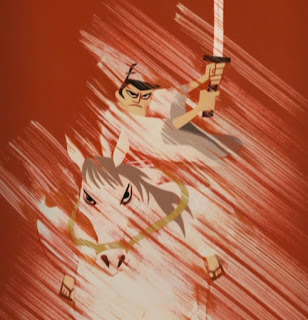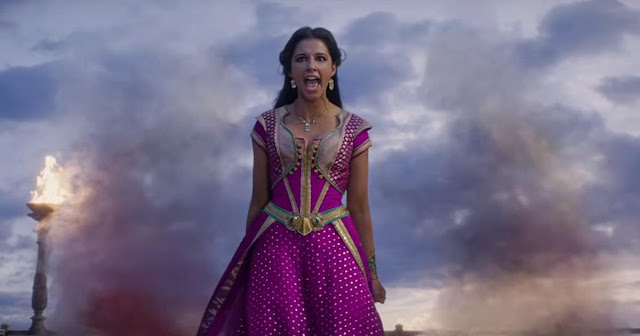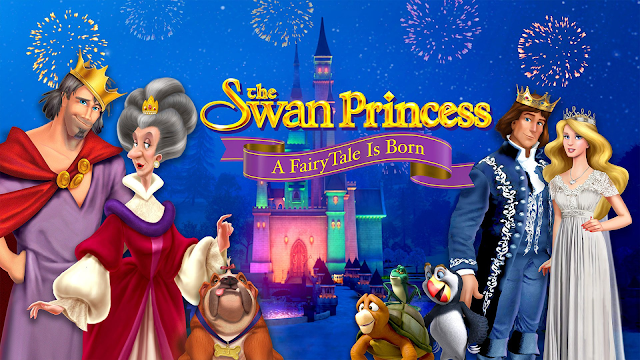The Rise and Fall of the Animated Prince
Let's take a moment to talk about princes. Why princes? Because they never really had a chance. At their best, they are seen as a coveted accessory for princesses, and at their worst, they are seen as promoting unhealthy sexist ideals to vulnerable children that women are unable to take care of themselves. Because of the latter setback, princes have gotten the short end of the stick in recent animated movies, whether it's being portrayed as useless in Brave, evil in Frozen, or completely nonexistent in Moana. Sadly, Disney had just started to improve their prince formula around the time that this brutal take-down of chivalry took place. Why can't we have the best of both worlds?
The reason for the lack of developed male characters in animated films hearkens back to the very first one, Snow White and the Seven Dwarfs. Initially, the nameless Prince was supposed to be a much more important character. Most of his scenes were cut from the film because the studio had so much trouble animating a realistic human man at the time. Keep in mind, this was the first time anyone had attempted to animate a full-length film. Yet, it seems like princes were held to these simplistic standards for many years after animation techniques had improved. Prince Charming from Cinderella barely had anymore dialogue than our initial Prince, despite the animators having had thirteen additional years of practice. At least Phillip from Sleeping Beauty had some semblance of a personality. Even Prince Eric from The Little Mermaid, over 50 years after Snow White, barely had any inkling of one, which was in part why Ariel gets so much criticism for giving up her voice for a man who isn't even all that interesting.
After Beauty and the Beast came out in 1991, the studio got a little better at developing the love interests in their princess movies, most likely due to Belle and Beast having equal billing, thanks to the late Howard Ashman. When they started developing their princes by making them heavily flawed, though, it took away from how likeable they were. I'm not saying I didn't fall in love with Beast by the end of the movie, but his tendency to throw things at Belle when she went to the West Wing against his wishes was problematic. Aladdin made up for being a thief by giving away his stolen goods to two children at the beginning of the movie, but this still didn't make up for the fact that he lied to Jasmine multiple times. At least she was smart enough to see through it. In a similar way, Naveen needed Tiana's strengths in The Princess and the Frog to make up for his own weaknesses of being a lazy glutton. Now, I think that Tiana is a fantastic role model for girls and amazing character, but Naveen was a bit too flawed for me to care about him that much, despite spending most of the movie as a charming frog.
Then, there's Flynn Rider, aka Eugene Fitzherbert from Tangled. Clearly, Disney had learned from their mistakes when they wrote him. I'm not saying he's my favorite prince, but he is one of the most developed male leads in any princess movie. He is indeed a flawed character, but he has a backstory that explains his flaws, and he never does anything to hurt Rapunzel or lie to her, despite being whacked in the head with a frying pan multiple times. Even though I wasn't thrilled that they had turned him from a prince to a thief, in spite of his roots, I found myself caring for him anyway by the end of the movie. Unfortunately, he was the last Disney Prince who didn't turn out to be evil. I don't count Kristoff because Hans had already been established as the prince from Frozen, and the romance was thrown in at the last minute, even though it directly contradicted the theme of getting to know someone before you fall in love with them.
Disney dropped the ball on having strong male leads when they had only just begun to understand how to create a great one. It's a real shame, considering that they had made so much progress giving their princes after Snow White and Cinderella more dialogue, Beauty and the Beast more flaws, and Tangled more sympathetic backstories. In many ways, the prince legacy ended before it truly had a chance to begin. Princesses have been fantastic role models for girls ever since the beginning, so why were they never able to do the same for boys?
If you were to ask me who the best animated prince is, the answer may surprise you.
It's Samurai Jack. I'm sure I'm not alone in believing that this is by far Genndy Tartakovsky's greatest work. Now, I realize this Cartoon Network series is very different from the movies and shows that Disney produces, especially the recent Adult Swim revival, but hear me out. Jack is literally a prince on a white horse, on a quest to rescue anyone who's life has been tarnished by evil. He is pure, humble, honest, kind, brave, strong, and everything you could possibly want from a fairy tale prince. Yet, he is not without his flaws. His tragic past haunts him every day since he was flung into the future by his nemesis, Aku, and his naive nature makes it difficult for him to acclimate to a land ruled by malice. Yet, none of these flaws prevent him from being a sympathetic character or a fantastic role model. If animated fairy tale films had more princes like Jack, maybe the prince archetype would not have been neglected so hastily.
The reason for the lack of developed male characters in animated films hearkens back to the very first one, Snow White and the Seven Dwarfs. Initially, the nameless Prince was supposed to be a much more important character. Most of his scenes were cut from the film because the studio had so much trouble animating a realistic human man at the time. Keep in mind, this was the first time anyone had attempted to animate a full-length film. Yet, it seems like princes were held to these simplistic standards for many years after animation techniques had improved. Prince Charming from Cinderella barely had anymore dialogue than our initial Prince, despite the animators having had thirteen additional years of practice. At least Phillip from Sleeping Beauty had some semblance of a personality. Even Prince Eric from The Little Mermaid, over 50 years after Snow White, barely had any inkling of one, which was in part why Ariel gets so much criticism for giving up her voice for a man who isn't even all that interesting.
After Beauty and the Beast came out in 1991, the studio got a little better at developing the love interests in their princess movies, most likely due to Belle and Beast having equal billing, thanks to the late Howard Ashman. When they started developing their princes by making them heavily flawed, though, it took away from how likeable they were. I'm not saying I didn't fall in love with Beast by the end of the movie, but his tendency to throw things at Belle when she went to the West Wing against his wishes was problematic. Aladdin made up for being a thief by giving away his stolen goods to two children at the beginning of the movie, but this still didn't make up for the fact that he lied to Jasmine multiple times. At least she was smart enough to see through it. In a similar way, Naveen needed Tiana's strengths in The Princess and the Frog to make up for his own weaknesses of being a lazy glutton. Now, I think that Tiana is a fantastic role model for girls and amazing character, but Naveen was a bit too flawed for me to care about him that much, despite spending most of the movie as a charming frog.
Then, there's Flynn Rider, aka Eugene Fitzherbert from Tangled. Clearly, Disney had learned from their mistakes when they wrote him. I'm not saying he's my favorite prince, but he is one of the most developed male leads in any princess movie. He is indeed a flawed character, but he has a backstory that explains his flaws, and he never does anything to hurt Rapunzel or lie to her, despite being whacked in the head with a frying pan multiple times. Even though I wasn't thrilled that they had turned him from a prince to a thief, in spite of his roots, I found myself caring for him anyway by the end of the movie. Unfortunately, he was the last Disney Prince who didn't turn out to be evil. I don't count Kristoff because Hans had already been established as the prince from Frozen, and the romance was thrown in at the last minute, even though it directly contradicted the theme of getting to know someone before you fall in love with them.
Disney dropped the ball on having strong male leads when they had only just begun to understand how to create a great one. It's a real shame, considering that they had made so much progress giving their princes after Snow White and Cinderella more dialogue, Beauty and the Beast more flaws, and Tangled more sympathetic backstories. In many ways, the prince legacy ended before it truly had a chance to begin. Princesses have been fantastic role models for girls ever since the beginning, so why were they never able to do the same for boys?
If you were to ask me who the best animated prince is, the answer may surprise you.
It's Samurai Jack. I'm sure I'm not alone in believing that this is by far Genndy Tartakovsky's greatest work. Now, I realize this Cartoon Network series is very different from the movies and shows that Disney produces, especially the recent Adult Swim revival, but hear me out. Jack is literally a prince on a white horse, on a quest to rescue anyone who's life has been tarnished by evil. He is pure, humble, honest, kind, brave, strong, and everything you could possibly want from a fairy tale prince. Yet, he is not without his flaws. His tragic past haunts him every day since he was flung into the future by his nemesis, Aku, and his naive nature makes it difficult for him to acclimate to a land ruled by malice. Yet, none of these flaws prevent him from being a sympathetic character or a fantastic role model. If animated fairy tale films had more princes like Jack, maybe the prince archetype would not have been neglected so hastily.












Comments
It even made Snow's wicked step-mom way more interesting and sympathetic, instead of just a jealous "Oh she's more pretty than I am so she has to go!" stereotype as she was in the original movie.
The fact the show's Prince and Snow actors hooked up and formed a real life romance and family is a cute aside too. LOL, a real life "prince and princess" romance spun off from that show! SO CUTE!